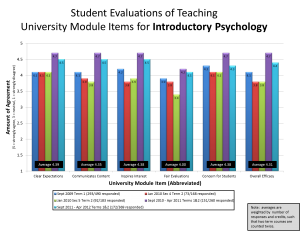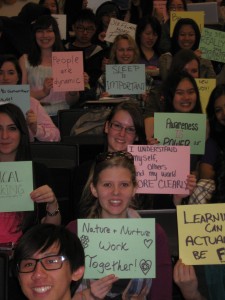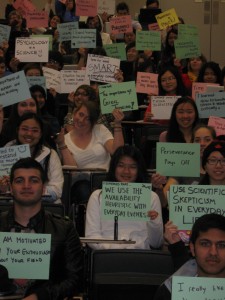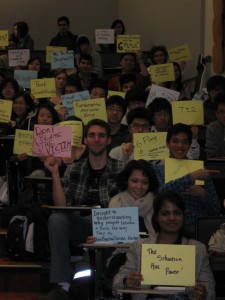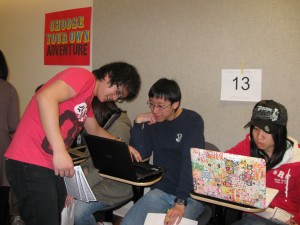Welcome to part three of my reflections on student evaluations of teaching from 2011/2012. Please see my earlier posts for a general introduction and reflection on feedback from my Psyc 217 research methods and Psyc 100 intro course. I have also posted graphs that facilitate comparison across all my courses and years I have taught them.
First, as always, I would like to thank each of my students who took the time to complete a student evaluation of teaching this year. I value hearing from each of you, and every year your feedback helps me to become a better teacher. Please note that with respect to the open-ended responses, I appreciate and consider every thoughtful comment. The ones I write about are typically those that reflect common themes echoed by numerous students.
Psyc 208 Section 2 Special Topics: How social psychology can help you succeed
This special topics course is one that’s near and dear to my heart. I developed it with the goal to help students learn to learn. It’s an applied social/sport/positive psychology course, where I have hand-picked the topics and consistently encourage their application to each student’s personal learning journey. This course includes a group project for which the ultimate goal is to learn to identify a problem in your life, then find and evaluate research-based ideas to address it, then share your findings with others. See the syllabus for more information.
Last year in 2010/2011, I almost completely revamped the course based on students’ feedback and my own experiences the year before. You’ll see a major improvement in students’ perspectives on this course when you look at the graph comparing the quantitative data from the first offering in 2009 to last year. This year, I didn’t change much after that total revamp the year before. The evaluations from 2011/2012 are very close to those from 2010/2011, which supports my hypothesis that the revamp was a very positive change. Both “fair evaluations” and “clarity of expectations” are lower than where I’d like to see them, and they’re actually the lowest of all my courses last year. This warrants action.
Two main themes came out of the comments. First, the midterm was perceived to be too long. This surprised me, given that I shortened it from last year based on similar feedback, and do not recall that sentiment being shared with me during the semester. It seems that again I need to reduce the length of that midterm. Related to the midterm topic, a number of students reported being unsure about how the textbook material would be represented on the midterm. One student made the helpful suggestion that I note which parts of the readings are “need to know” parts. I’m not sure how I can do that and not compromise the test, but it’s definitely worth some strategizing about how I can better prepare students to integrate that material.
The second consistent theme was the groupwork. A few people seemed frustrated by it, some appreciated its place in the course and still others enjoyed it. I’ve often received such mixed feedback about groupwork. One comment about groupwork that I found particularly interesting was this:
Overall, your class and you were very engaging and I learnt a lot in the class, I enjoy the material quite a lot and find myself spreading the knowledge outside of class. I always enjoyed going to class and I liked seeing the team projects. I however do not particularly like team projects but it was useful for this course and in our future lives. I feel team projects just take so much longer than doing it yourself and that when you get some classmates that do not care about their marks, it really puts more weight on the rest of us.
This comment stood out for me because it takes a common sentiment–that people often dislike groupwork because of relying on others–but recognizes its appropriateness in this course. Not too many people took this perspective, but it’s one that I hope to cultivate more. Its practical value is exactly why I designed this team project in the first place. Based on this and other feedback, I need to work on communicating that intention and the expectations of it more clearly. I think after using this assignment twice now (including tweaking it for 2011/2012), I have an even clearer idea of what I expect from these projects. I will do my best to communicate those expectations more clearly. One of the changes I made based on last year’s feedback was to adjust the proportion of the grade devoted to the group versus individual components. Interestingly, no one mentioned this individual/group grade proportions, suggesting this weighting is no longer an issue.
Last, quite a few people made comments suggesting that my overall intentions in creating this course are being realized (well, getting there at least!). Here a couple of examples:
Awesome course! I enjoyed the emphasis on active learning. It was a nice change from the classes I usually take.
Clearer guidelines for assignments and groupwork would be helpful. Otherwise, I really enjoyed this course- it was helpful both academically and personally.
I have enjoyed the setting of “team environment” throughout this course. Engaging students in the subject encouraged me to learn more effectively and study more efficiently.
Thank you for your thoughtful feedback. I will definitely work on clarifying those expectations, and will shorten the midterm for next year. I’m glad that many of you found the active learning emphasis helpful for your learning!
Stay tuned for one more…!

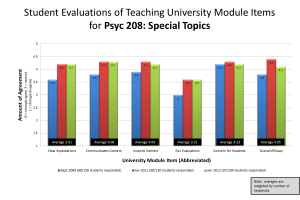
 Follow
Follow
